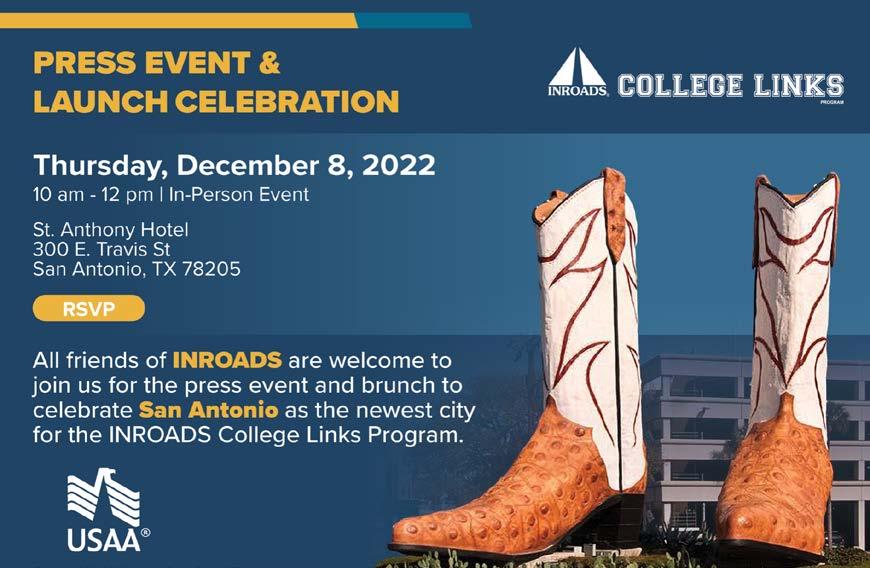
3 minute read
Opening the door to the C-suite
The INROADS paid internship program is helping level the corporate playing field

Advertisement
AS SEEN IN WAYMAKER
MAGAZINE PUBLISHED SUMMER 2022
Student internships may be a proven foot-in-thedoor career advancer for young people starting out their working lives, but many can’t afford to put in all those hours for free, as most such opportunities require. That’s where INROADS is making a difference, providing paid internship opportunities for underserved minority communities. For more than 50 years, the nonprofit — founded by a white businessman unhappy with the inequities he saw in corporate America — has helped diverse students develop their skills to make the most of what can be life-changing placements.
From modest beginnings — starting with 25 interns and 17 sponsoring organizations — INROADS has grown into the leading organization of its kind. Each year around 1,500 students secure internships at some 200 sponsoring businesses, including leading Fortune 500 companies. The INROADS 30,000 alumni include top business leaders like Thasunda Brown Duckett, the CEO of Teachers Insurance and Annuity Association of America and one of only two African American females leading a Fortune 100 company. But the success of INROADS is not only to be seen in corporate boardrooms but in personal bank accounts: 76% of alumni are homeowners while 40% have family assets between $500,000 and $5 million.

That’s very different from the norm. INROADS cites 71% of whites being homeowners compared to 45% of Hispanics/Latinos and 41% of Blacks. Meanwhile, the average net worth of a white family stands at $171,000. For Latino/Hispanic families it is $21,000 and for Black families just over $17,000.
“We’ve known this all along,” explains INROADS President and CEO Forest T. Harper, “that a paid internship actually starts you off with good economic balance.” It starts with being rewarded for your skills, then leads to full-time employment possibilities, which bring with them benefits, bonuses, 401(k) plans. “They begin to get on the economic train for mobility and to higher income,” says Harper, “and that’s why internships pave the way to economic independence by starting off with paid internships.”
“POWER SKILLS”
INROADS internships are intended for undergraduate students in a four-year college or community college. Anyone with a 2.8 GPA can apply for a spot (www. INROADS.org) and the application is free. However, acceptance is not a shoo-in. Nor is an internship; INROADS sends two candidates for each opportunity.
“They get to compete for that one role, and it should be that way,” Harper says. “We want you to put your best foot forward ... it’s not guaranteed. Nobody makes a promise. You have to go out and earn it just like you would in sports, just like with anything else ... it’s highly competitive.”
INROADS programs aim to help prepare students for their interviews and then support them through the internship experience. They are required to complete mock interviews to get used to presenting themselves professionally and showcasing their problem-solving abilities.
INROADS calls the abilities it wants students to develop “power skills,” not soft skills as many people refer to them. “Like the Power Rangers, right?” says Harper. “If you get these skills, you can do just about any job, no matter what the specialty is.”
“UP TO BAT”
The fallout of the coronavirus pandemic hit minority communities disproportionately hard, leaving some of their young people wondering whether it’s really worth the financial struggle of pursuing further education.
Opportunities like those with INROADS are still worth pursuing. “First of all, there are really two key things that you want to have as a human being,” Harper adds. “You want to have access and opportunity, equal to you just like anybody else. Unfortunately, the playing field is not level for you. It’s not, let’s be realistic about this. You can have as much talent as you want, but education gives you a chance to get up to bat.”
“MY PURPOSE”
Echoing the INROADS founder’s sense of calling, Harper describes his work there as “not a job. This is ministry for me, because it’s about my purpose.” When he speaks about the possibilities for young people to overcome adversity, he’s not just talking about the success stories of INROADS, but from personal experience.
Then one day, says Harper, “I looked in the mirror and I said to myself, ‘Forest, there’s nothing you can do about being the first, but there’s always something you can do about being the only.’ So, from that point on my purpose became: I’ve got to make sure I help others, not just be the only, but be more.”
More businesses have been talking about improving opportunities and access for minorities in the past couple of years. Harper welcomes how businesses have increased minority hiring at the pipeline level.
“Now that’s a good start, corporate America, but guess what? Let’s see you finish it. And what that means is, let’s now hire them. We’ve seen the spending; we’ve seen the commitment. Now let’s go through with the hiring, and we’ll see that in a couple of years.” Harper said.







